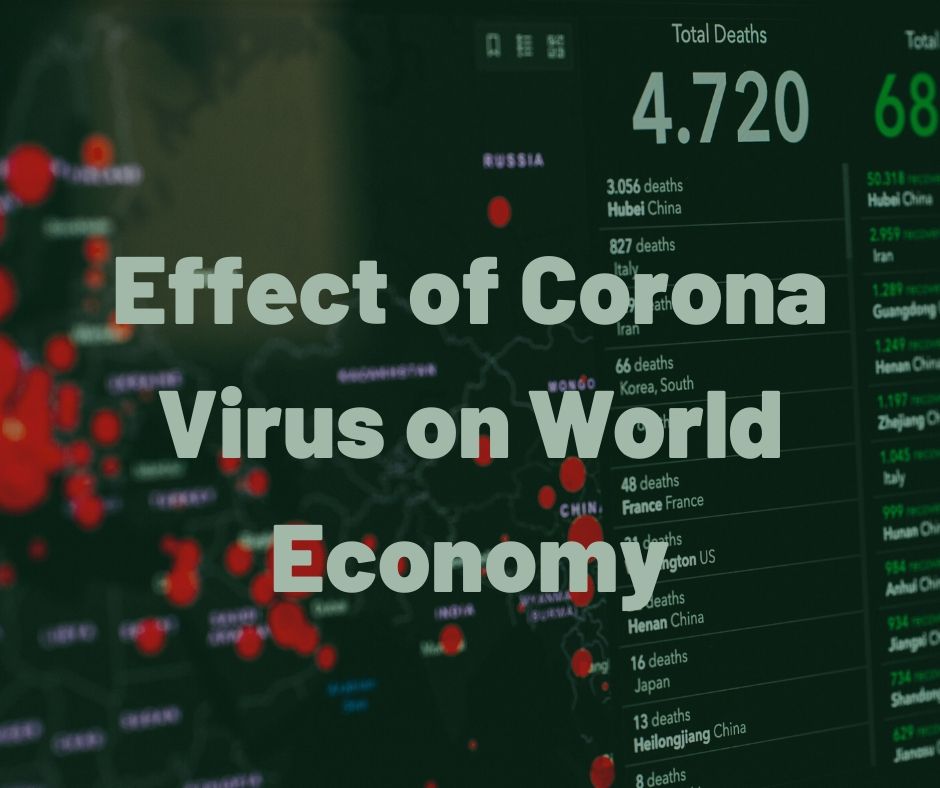Effect of Coronavirus on World Economy | Will there be a Recession in 2020?
- 8 April 2020 | 1734 Views | By Abhinav Mishra

Are we on the brink of another recession? Who benefits in such situation? Is the housing market going to crash in 2020? These are the few of many anxious The most repeated and talked about word, due to which almost all of us are at homes is the “Corona Virus”. The coronavirus outbreak has not only impacted us individuals at micro levels but also plunged the world’s economy into a global recession and changes the scenario at macro levels. Let us first understand the meaning of recession.
What is a Recession?
Going strictly by the dictionary definition, it is a period when the economic output contracts for two straight quarters. Recessions generally occur when there is a widespread drop in the spending capacity of individuals. This could be triggered by multiple factors like a financial crisis or an external trade shock, or an adverse supply shock or a pandemic (like the coronavirus) or the bursting of an economic bubble.
Will there be a Recession in 2020?
Abiding by the definition of recession, even if we’re in a recession right now, an official declaration may be months away. We could officially say it once two-quarters of data are in. Data is often a lagging indicator, but given the state of affairs, we don’t really need to wait to figure out what’s happening as a recession could be obvious in the data and generally recognized as reality before any official declaration, though. Even the Stock markets have reflected the economic alarm.
What’s happening right now is a combination of supply and demand constraints. Now, fears are rising that this downturn could be far more punishing and long lasting than initially feared. This could even potentially endure into next year, and even beyond. The downturn of this virus could be sudden and sharp. Although a constructive and timely response from policymakers, companies, and households could limit its duration, its effects will be felt for decades to come.
Situation world over: How do you prepare for a Recession?
Before the pandemic occurred, many major economies, including giants like Germany, Italy, and Japan, were already under-equipped to handle even small adverse external shocks. Other economies, such as China and the United States, had stronger organic growth momentum, but even that could not prove to be sufficient to deter a downturn.
When the pandemic emerged, initially in China, it was viewed as a sizeable threat to their economy. Even as China locked itself down, the abrupt halt of commercial activity threatened to impose economic pain, as there was suffer lost sales to Chinese consumers, while manufacturers all across the globe would battle to secure parts made in the Chinese factories. China makes up a much larger share of the world economy, and the legal constraints like shutting down of cities and states, bars, restaurants, gyms, etc., and people being laid off is definitely going to impact the global economy.
But then the pandemic spread to Italy and ultimately across the whole of Europe, threatening factories on the continent. Then came into force the government policies that effectively locked down the modern life, business included. While all this was ongoing, the virus spread its wings into the United States. The United States, claimed to be the world’s largest economy, is certainly in a recession and so is Europe. So are probably all other significant economies like Canada, Japan, South Korea, Singapore, Brazil, Argentina, and Mexico, etc.
Situation in Developing Nations
The situation looks exceptionally calamitous in the developing countries, which have seen the investment rush for the exits this year. Impacts on these economies include currencies dipping, people paying more for imported food and fuel, and thus threatening governments with a dire situation of insolvency. All of this while the pandemic itself threatens to overpower inadequate medical systems.
If we talk about the private sector, their income statements and balance sheets will be hit hard, from all sides. Revenues are expected to decline sharply and the costs, on the contrary, would go up. They may have to deploy their Cash cushions too. New bond issuances will be almost impossible, especially for companies with significant debt to refinance. Stock markets might witness huge volatility around a downward trend. Layoffs across the globe are taking place in waves. Everyone is producing less, spending less, and consuming less.
As governments across the globe intensify restrictions on business to halt the spread of the pandemic, and as the distress of the virus reconfigures the very concept of public space, hampering consumer-led economic growth, it might take two to three years for most economies to return to their pre-pandemic levels of output.
Now, anywhere we glance in the global economy we are seeing a hit to domestic demand on top of those supply chain impacts. The virus had has such hard-hitting impact that for the first time ever, the Olympic 2020 Games have been postponed to 2021. Sports leagues such as the NBA and NHL have suspended games. The travel and hospitality industries have been decimated as people avoid flying and cruise vacations. So too are industries tied to travel and tourism.
After more than a decade of expansion, the next recession is here.
Incidents when Non-Monetary events led to Recession
There have been incidents in history when many non-monetary events like wars and pandemics have led to an era of recession. Not going very far in history, in the early 1800s, there was a post-Napoleonic economic depression in Europe and the United States after the end of the Napoleonic War In 1815.
Then occurred The Great Depression of British Agriculture. It occurred from 1873 to 1896. Britain’s agricultural depression was triggered by the sudden and dramatic fall in the grain prices that led to the opening up of the American prairies to cultivation in the 1870s and the beginning of cheap transportation with the rise of steamships.
Recession After World War I
Then came the post–World War I recession. It was a recession that hit much of the world in the aftermath of World War I. After the war ended, the global economy began to decline. The year 1920 was the solitary most deflationary year in the American history. Many factors have been pointed out by the economists that potentially caused or contributed to this downturn. These included troops returning from the war, which created a surge in the civilian labor force and which ultimately led to more unemployment and wage stagnation.
Recession After World War II
Next was the recession following the end of World War II. There were large adjustments as the economy adjusted from wartime to peacetime in 1945. The causes included similar factors such as unemployment and GDP. Post this; the world even witnessed a recession due to quadrupling of oil prices by OPEC during 1973-75.
And today as we all can see the 2019–20 coronavirus pandemic is having far-reaching consequences beyond the spread of the disease. As the pandemic has spread around the globe, everyone wants to know if the new coronavirus will cause a global recession. The short answer is that it definitely could.
Ending words
While this crisis is entirely different in its origins from all the previous ones, it is still following a similar cycle of collapsing consumer and stock market confidence. Leading to a spiraling down of demand, growth, employment, and incomes.
The 2007-2009 recession lasted for about 18 months, making it the longest since the Great Depression. Other measures of a recession’s severity are how much the economy contracts and how bad unemployment gets. The supply shortages are definitely expected to affect a number of sectors. Concerns have even shifted from supply-side manufacturing issues to decreased business in the services sector. The disruption to factories and logistics too will have a great impact on the world economy. There have been extensive reports of supply shortages of pharmaceuticals, with many areas seeing panic buying and consequent shortages of food and other essential grocery items. The technology industry, in particular, has been warning about delays to shipments of electronic goods too. As the coronavirus spreads around the world, the stock markets have experienced their worst crash since 1987.
Loss to the Global Economy
Going by the numbers, about 5 million people in China have lost their jobs and many of China’s nearly 300 million rural migrant workers have been stranded at home. In March 2020, more than 10 million Americans have lost their jobs and applied for government aid. The coronavirus outbreak could cost 47 million jobs in the United States and the unemployment rate may hit 32%, according to estimates by the Federal Reserve Bank of St. Louis.
The lockdown in India too has left tens of millions of migratory workers unemployed. Close to 900,000 workers lost their jobs in Spain since the country went into lockdown in mid-March 2020. So is the case with nearly 4 million French workers applying for temporary unemployment benefits. Around 500,000 companies from various sectors in Germany, have been forced to send their workers on government-subsidized short-time working schemes. Mass joblessness exacts societal costs. Pervasive bankruptcy could leave the industries in a destabilized state, short of investment and innovation.
How long shall this coronavirus outbreak Continue?
Of course, the big question is how long does this coronavirus outbreak go on? If the coronavirus isn’t contained and these trends continue, the likelihood of a global recession increases. It’s also important to remember that the coronavirus is just one factor, which might exacerbate other strains on the global economy, like trade wars.
But even after the virus is tamed (no one really knows when that will be), the world that emerges is likely to be choked with trouble, challenging the recovery. But if governments respond appropriately and this outbreak is blunted, the worst-case scenario will probably be avoided. That doesn’t mean it will be averted equally around the world, or even in all industries or labor forces.
The central banks are already racing to stop a recession either by cutting down the interest rates or by intervening in markets, buying corporate assets or helping banks to keep lending to businesses. The People’s Bank of China has injected over 170 billion yuan into the economy, and the Bank of Japan boosted asset purchases to stabilize markets. The U.S. Federal Reserve has reported its benchmark rates to zero. The impact of this pandemic could be so profound and enduring in every region of the world at once that recovery could take years.









